Did you know that Akitas are renowned for their unwavering loyalty and devotion to their owners?
This remarkable breed has a reputation for forming deep attachments and displaying steadfast loyalty to a select few.
Akitas are often considered one of the most difficult dog breeds to own due to their independent and protective temperament.
They are known for their fierce loyalty, but are they truly one person dogs?
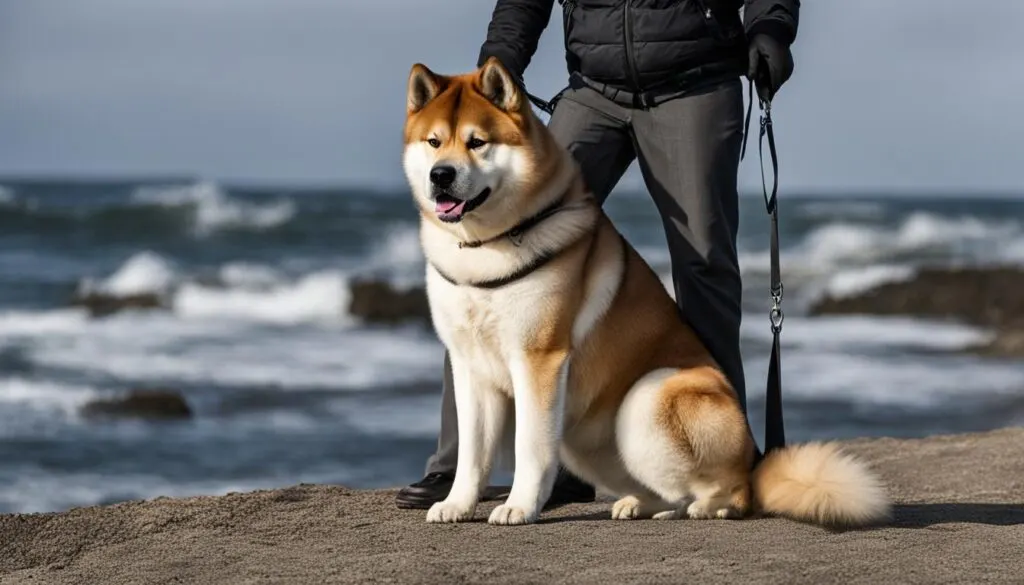
Click Here to Jump to a Section
Key Takeaways:
- Akitas are known for their unwavering loyalty to their owners.
- Their independent and protective temperament makes them challenging but rewarding companions.
- While Akitas often form strong bonds with a primary caregiver, they can also show affection and loyalty to other family members.
- Understanding their unique temperament is crucial for providing the best care and training for Akitas.
- Exploring the origins and cultural significance of Akitas can shed light on their loyalty and temperament.
The Nobility of Akitas: A Japanese Heritage
The Akita Inu breed is deeply rooted in Japanese history and culture, carrying with it a sense of nobility and significance. Originating in Japan, the Akita Inu holds a special place in the hearts of the Japanese people.
The Akita Inu’s Origins and Cultural Significance
The Akita Inu’s origins can be traced back to the mountainous regions of northern Japan, where they were originally bred for hunting large game such as bears and boars.
Revered for their strength, agility, and loyalty, Akitas were highly valued and often seen as symbols of power and protection.
Over time, the Akita Inu became associated with Japanese royalty and nobility.
They were treasured as faithful companions and protectors, and were even presented as gifts to foreign dignitaries, making them ambassadors of Japanese culture.
In Japanese culture, the Akita Inu is seen as a symbol of good health, happiness, and prosperity.
They are often depicted in artwork and folklore, showcasing their importance in Japanese society.
To this day, the Akita Inu remains one of the most cherished and iconic breeds in Japan.
The Influence of Historical Events on the Akita Breed
Throughout history, the Akita breed has been shaped by various events and influences, further adding to their cultural significance.
One such event was the Japanese feudal era, where Akitas were favored by samurais and aristocrats for their protective nature and unwavering loyalty.
In the early 20th century, however, the Akita breed faced a significant threat to its existence.
During World War II, Akitas were bred with German Shepherds in an effort to save the breed from extinction.
While this mingling altered their appearance and temperament to some extent, it ultimately preserved the Akita lineage.
Today, the Akita Inu remains a symbol of national pride in Japan, and efforts to preserve their heritage and breed standards are ongoing.
The breed’s historical significance and cultural importance continue to captivate dog enthusiasts and admirers worldwide.
Are Akitas One Person Dogs?
Understanding Akita Loyalty and Owner Attachment
Akitas are renowned for their unwavering loyalty and deep attachment to their owners.
This section explores the unique bond that forms between Akitas and their chosen companions.
Akitas have a natural tendency to form a strong connection with one person, often referred to as their “person.”
This loyalty stems from their history as guard dogs and their instinct to protect their loved ones.
Akitas are known to dedicate themselves wholeheartedly to their chosen individual, offering undying loyalty and affection.
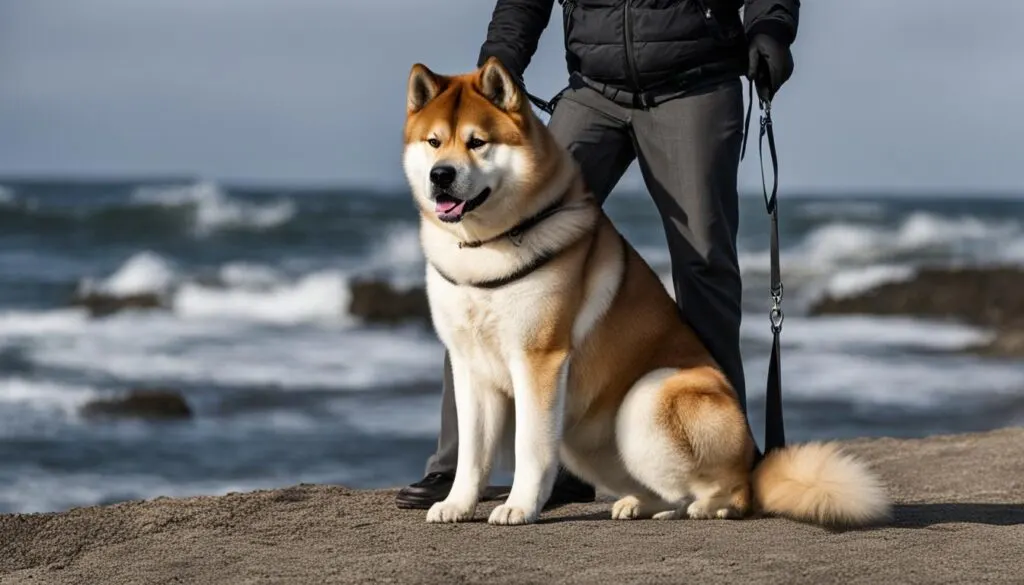
This image showcases the unwavering loyalty of an Akita, illustrating their deep commitment to their owner.
Are Akitas Loyal to One Owner? Evaluating Breed Tendencies
While Akitas typically form a strong bond with one person, it is important to note that individual differences may exist within the breed.
Some Akitas may exhibit loyalty to multiple family members or show affection to those who have earned their trust.
However, the breed’s general tendency to be loyal to one primary owner remains prevalent.
This loyalty and owner attachment also extend to Akita families, as these dogs form strong bonds with all household members.
Akitas are highly protective of their loved ones, making them excellent family guardians in addition to being loyal companions.
Understanding the loyalty and owner attachment of Akitas is essential for those considering this remarkable breed.
The strong bond formed with an Akita can create a lifetime of companionship and devotion.
Akita Temperament: Independence Meets Fidelity
Akitas possess a temperament that is both independent and faithful, making them a unique and fascinating breed.
Understanding their temperament is crucial for establishing a strong bond and ensuring their well-being.
The Role of Early Socialization in Akita Behavior
Early socialization plays a vital role in shaping an Akita’s behavior and temperament.
Introducing them to various people, animals, and environments from a young age helps them develop appropriate social skills and become well-rounded companions.
During the socialization process, it is essential to expose Akitas to different situations to prevent fear or aggression.
Positive experiences, such as supervised interactions with other dogs and gentle exposure to new stimuli, can help Akitas develop confidence and become more adaptable.
Navigating the Akita’s Protective Instincts
Akitas are naturally protective and have a strong instinct to guard their family and territory.
While this protective nature is a desirable trait, it requires careful management to ensure their behavior remains appropriate.
Properly training and socializing Akitas from an early age can help them discern between potential threats and harmless situations.
Teaching them basic obedience commands, such as “sit,” “stay,” and “leave it,” greatly aids in managing their protective instincts.
It is important for Akita owners to provide consistent leadership and establish themselves as the pack leader.
This helps Akitas feel secure and trust their owner’s decisions, reducing the likelihood of overprotective or aggressive behavior.
When introducing new people or animals to an Akita, it is crucial to supervise interactions to prevent any potential conflicts.
Ensuring a calm and controlled environment during these introductions helps Akitas feel more comfortable and reduces the likelihood of negative reactions.
By understanding the unique temperament of Akitas, focusing on early socialization, and managing their protective instincts, owners can create a harmonious and fulfilling relationship with their loyal Akita companions.
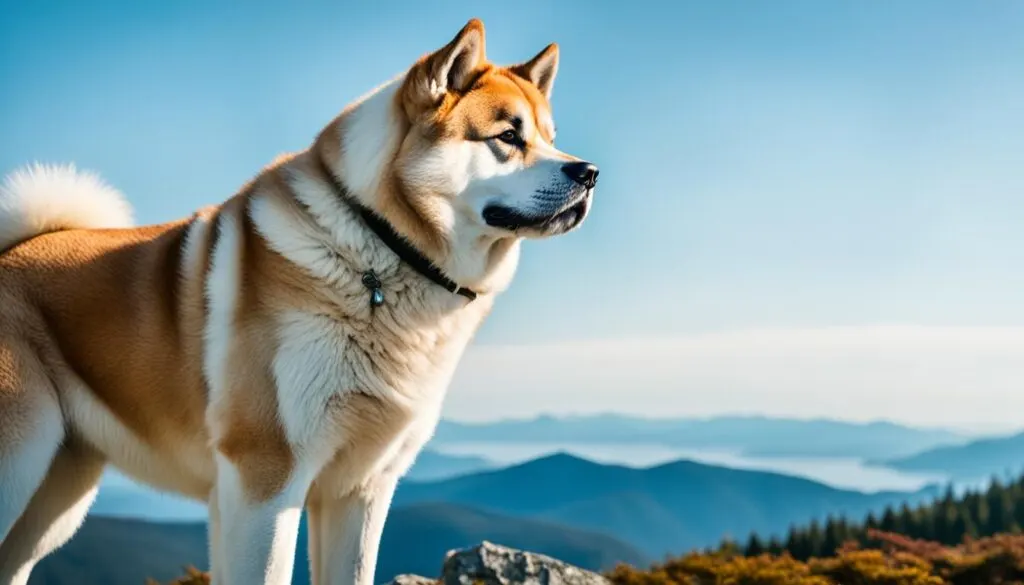
The Remarkable Traits of Akita Companionship
Akitas are renowned for their remarkable traits as companions, making them a popular choice for dog lovers seeking a loyal and devoted four-legged friend.
When it comes to bonding with an Akita, there are certain aspects to expect that set this breed apart from others.
Additionally, Akita loyalty is considered a hallmark characteristic of the breed, further solidifying their reputation as faithful and dedicated companions.
Bonding with an Akita: What to Expect
Bonding with an Akita can be a truly rewarding experience.
These dogs have a strong desire for human companionship and will often form deep attachments with their owners.
However, bonding with an Akita may take some time and patience as they tend to be cautious and reserved with strangers.
It is important to establish trust and build a strong foundation of mutual respect to solidify the bond with your Akita.
To facilitate the bonding process, it is recommended to spend quality time with your Akita, engaging in activities that they enjoy.
This can include daily walks, obedience training, and playtime.
By showing consistency and providing positive reinforcement, you can strengthen the bond and create a sense of security for your Akita companion.
It is crucial to note that each Akita is unique and may have individual preferences when it comes to bonding.
Some may crave physical affection, while others may prefer to establish a strong bond through shared activities and mental stimulation.
Taking the time to understand your Akita’s needs and preferences will greatly contribute to a successful bond.
Akita Loyalty: A Hallmark of the Breed
Akita loyalty is deeply ingrained in their nature and has been a hallmark characteristic of the breed for centuries.
Akitas are renowned for their unwavering devotion to their owners and their strong sense of loyalty.
Once a bond is formed, an Akita will go to great lengths to protect and care for their loved ones.
Their inherent loyalty manifests in various ways, including their willingness to defend their family and home, their commitment to following commands, and their constant desire to be close to their owners.
This unwavering loyalty is a cherished trait among Akita enthusiasts and is one of the key reasons why these dogs make exceptional companions.
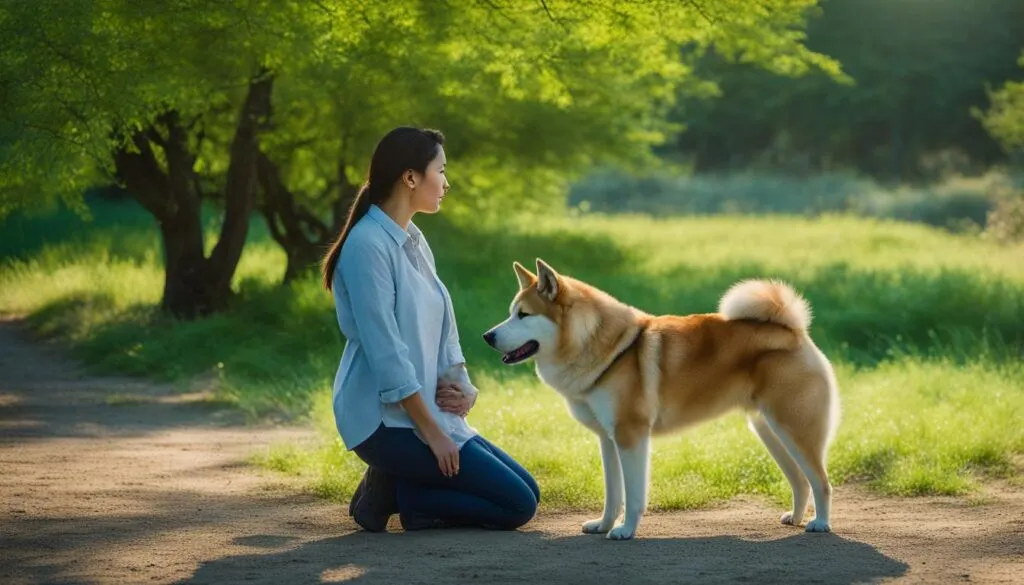
Overall, the remarkable traits of Akita companionship encompass their strong bonding abilities and the unwavering loyalty they exhibit.
Bonding with an Akita requires time, patience, and efforts to understand their individual preferences.
However, once a strong bond is established, the loyalty and companionship of these magnificent dogs are truly unparalleled.
Akita Inu Versus Shiba Inu: Distinguishing Between the Breeds
When it comes to choosing the perfect canine companion, two popular Japanese breeds often come to mind: the Akita Inu and the Shiba Inu.
While both breeds share some similarities, they also have distinct characteristics that set them apart.
Physical Characteristics and Temperament Differences
The Akita Inu is a large and powerful breed, known for its imposing size and majestic appearance.
With their thick double coats and muscular build, Akitas exude strength and presence.
In contrast, the Shiba Inu is a smaller breed, often described as “fox-like” due to its fluffy tail and alert expression.
Shiba Inus are agile and nimble, reflecting their hunting heritage.
When it comes to temperament, Akitas are typically known for their loyalty and protectiveness towards their family.
They are known to be more reserved and dignified, making them excellent guard dogs.
On the other hand, Shiba Inus are known for their independent and spirited nature.
They are often described as “cat-like” in their behavior, displaying a high level of intelligence and an independent streak.
The Impact of Size and Behavior on Pet Ownership
While both the Akita Inu and Shiba Inu can make wonderful pets, their size and behavior should be considered when choosing the right breed for your family.
Akitas require ample space due to their larger size and need for exercise.
They thrive in households with experienced owners who can provide proper training and socialization.
Shiba Inus, being smaller in size, are more adaptable to apartment living, but still, require regular exercise and mental stimulation to prevent boredom.
It is essential to consider the needs and temperamental differences of each breed to ensure a harmonious pet-owner relationship.
Whether you prefer the noble and imposing presence of an Akita Inu or the spirited and independent nature of a Shiba Inu, both breeds offer unique companionship and loyalty that can enrich your life.
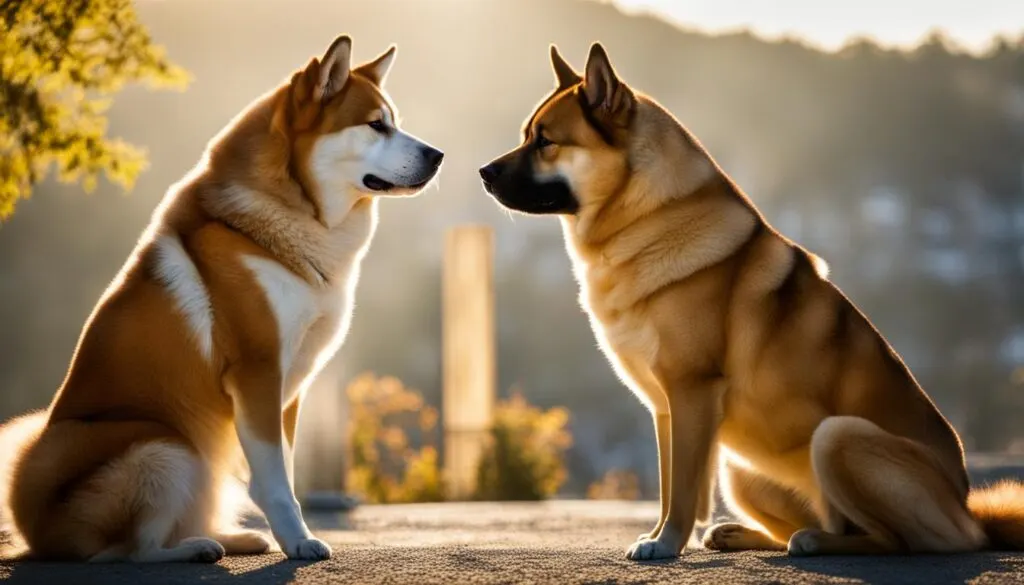
As you embark on your journey to find the perfect four-legged friend, consider the physical characteristics, temperament, and impact on pet ownership that differentiate the Akita Inu and the Shiba Inu.
By understanding these distinctions, you can make an informed decision and find the ideal breed that aligns with your lifestyle and preferences.
Creating an Enriching Environment for Your Akita
Akitas thrive in a stimulating and nurturing environment. To create an enriching space for your Akita, consider the following:
- Provide regular exercise: Akitas are an active breed and require daily exercise to keep them physically and mentally stimulated. Regular walks, playtime, and interactive toys can keep them engaged and help prevent boredom.
- Promote socialization: Expose your Akita to different people, animals, and environments from an early age to ensure they develop good social skills. Proper socialization can help reduce anxiety and fearfulness and contribute to a well-rounded and confident Akita.
- Create a safe and comfortable living space: Akitas appreciate having a designated space that is secure, comfortable, and provides them with a sense of ownership. Make sure they have a cozy bed, access to fresh water, and a peaceful area where they can retreat when they need some alone time.
- Mental stimulation: Akitas are intelligent dogs that enjoy mental challenges. Engage their minds with puzzle toys, obedience training, and other stimulating activities to prevent boredom and keep them mentally sharp.
By prioritizing the well-being of your Akita through sound health care practices and a nurturing environment, you can ensure they live a happy and fulfilling life as a beloved member of your family.
